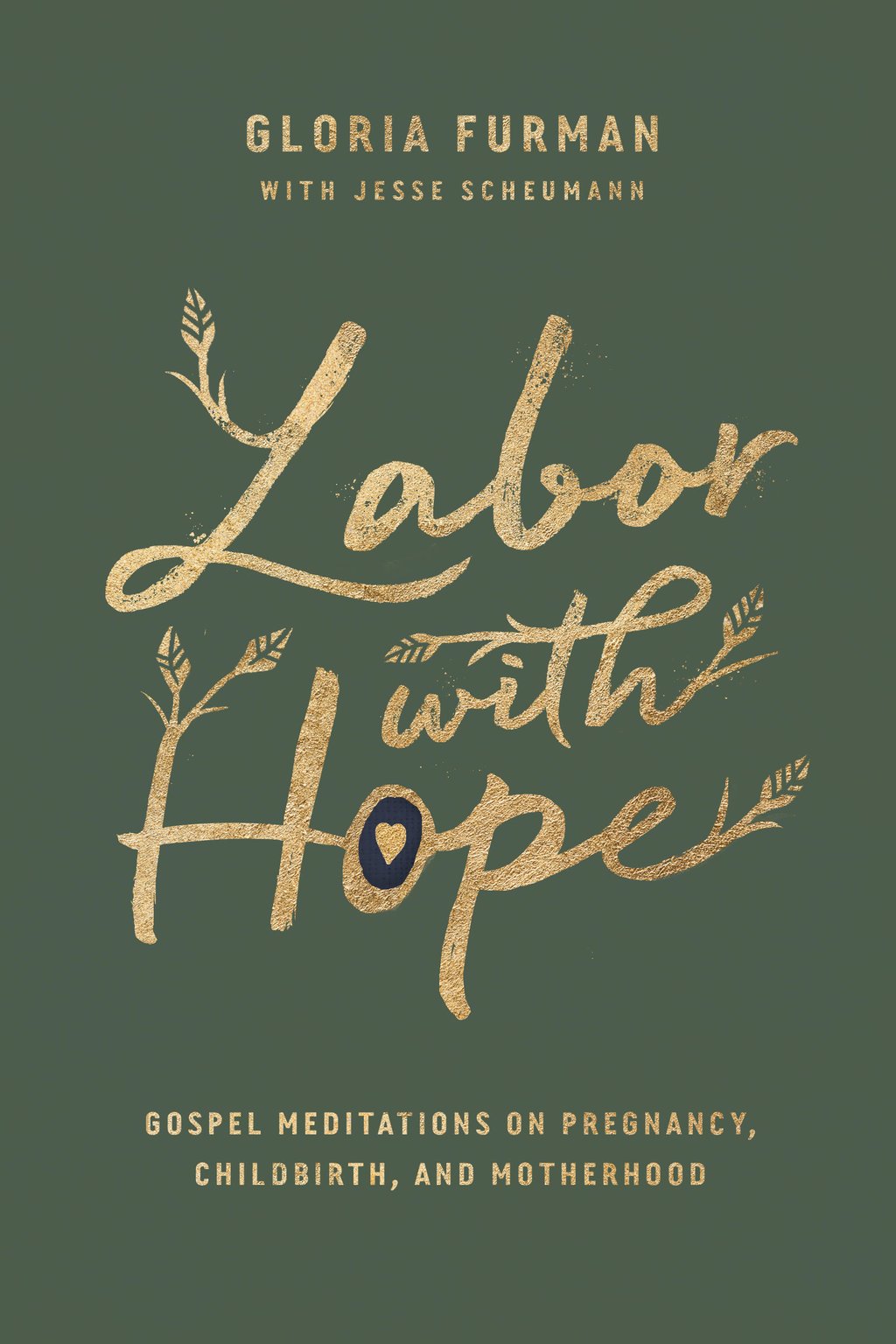My carefully typed five-page birth plan went out the window in a moment. In its place, one phrase played on a continuous loop through the rest of the delivery of my first son: “for the joy set before him” (Heb. 12:2). Experiencing birth pains gave me a deeper glimpse into the unthinkable pain Christ endured for me.
I’m not the only one who has made theological connections during labor. In their new book, Labor with Hope: Gospel Meditations on Pregnancy, Childbirth, and Motherhood, Gloria Furman (with insights from Jesse Scheumann) offers theological insights into pregnancy, childbirth, and motherhood. From the marriage of their two perspectives—a mother in the trenches and a teacher who wrote a dissertation titled “A Biblical Theology of Birth Pain”—an interesting book has been born.
Mothers desperately need resources that accord with reality as defined by the God who thought up childbearing. They need eternal perspective that will carry them through not only gestation and delivery but also the marathon that is motherhood. These 25 short meditations do both.
Though each meditation is bite-sized, they’re nourishing for the hungry souls of would-be, soon-to-be, or already-are mothers. The overarching concept is the idea that “the entire human experience of childbirth is a signpost for overwhelming joy and realities that will endure forever.”

Labor with Hope: Gospel Meditations on Pregnancy, Childbirth, and Motherhood
Gloria Furman
Labor with Hope: Gospel Meditations on Pregnancy, Childbirth, and Motherhood
Gloria Furman
The world is filled with mixed messages about pregnancy. Popular books and well-meaning family and friends offer you unsolicited advice about what to expect and how to stay healthy—sometimes resulting in joy and excitement but other times leading to discouragement and fear. The Bible, too, has a lot to say about childbirth—offering real hope that nothing in this world can match. In Labor with Hope, Gloria Furman helps you see pregnancy, infertility, miscarriage, birth pain, and new life in the framework of the larger biblical narrative, infusing cosmic meaning into your personal experience by exploring how they point to eternal realities.
Doxa and Diapers
Into the world of doctor visits and diapers, Furman brings doxa (the Greek word translated as “glory” throughout the New Testament). Furman disarmingly invites her readers to see motherhood in light of the grand narrative of redemption.
Likening a mother’s pain in childbearing and childrearing to the pain Christ endured to birth a new covenant people through his blood, Furman gives even the harrowing parts of motherhood a more holy meaning. When speaking of the curse that increased pain in childbearing, she writes, “Our multiplied pain in multiplying is intended to point us to a profound theological reality: we need a Deliverer.”
While being honest about the challenges of motherhood, Furman consistently points to the living hope offered in Christ. Furman writes, “In the face of all our sorrow-inducing fears, our hearts are assured that Christ has conquered death and guaranteed our everlasting joy.”
She also invites women who aren’t physical mothers into the conversation by opening the scope of motherhood to those seeking to nurture, disciple, and mentor others.
In a conversational and come-alongside-the-reader way, Furman takes principles and presses them into the reader’s experience. For example, after admitting that her feelings don’t always align with God’s truth, she encourages the reader to pray along with her:
Help me, Father. My feelings don’t match your Word. I want to love your Word and follow you more than I want to follow my feelings. Please change my feelings.
Over and over, Furman gently takes her reader by the hand, walking her away from fear, anxiety, and exhaustion and back toward the rock-solid truths of God’s Word.
First Things First
In today’s polemical culture, it’s easy to either set motherhood and children on a pedestal or push them to the periphery. Yet Furman continually bids her readers to keep first things first. Motherhood exists to point us and others to Christ and to conform us to his image.
Motherhood exists to point us and others to Christ and to conform us to his image.
Boldly swimming against the self-care movement, she invites her readers to follow the model of the Suffering Servant. In a meditation on Isaiah 53, Furman reminds the reader:
Our willingness to sacrificially lay down our wants and needs for the sake of our children’s good (when the world would insist that we crawl off the altar and refuse to lay our lives down) is our testimony of confidence in our powerful God to lead us through death to self and death itself into glory.
Theological Feast
In each meditation, Furman brings a theological feast to the table. She doesn’t limit herself to Psalm 139 and Proverbs 31; rather, she takes a historical-redemptive approach, tracing the concepts of labor pains and childbirth across the entire arc of Scripture. She doesn’t shy away from hard truths and realities like abortion and the judgment that remains for those who don’t hide in Christ.
I’d recommend this book to new moms. In it, they will find the straightforward yet beautiful and biblical perspective that is so often lacking in motherhood books. Furman admits in her introduction that “at times our pace will be quick.” As such, a reader unfamiliar with the greater arc of Scripture might find herself a little lost or dizzy. But a woman who knows the Bible—or who is willing to do some work to know it better—will benefit from the rich theology here.
When my son finally made his appearance in the delivery room, I couldn’t believe the wonder of his tiny fingernails, perfect toes, and downy hair. In that moment, my pain yielded to joy. As Furman reminds her readers, “All our groanings will end when we finally see what we’ve been hoping for, as the consummation of God’s promised restoration bursts forth in full.”




































